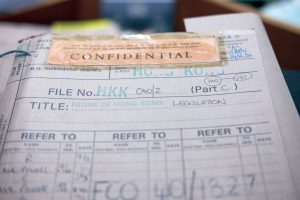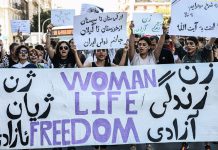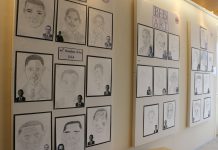As the colonial government created and preserved a large number of records according to the British archives law, the United Kingdom is a port of call for many Hong Kong scholars and journalists researching the history of Hong Kong.
Veteran journalist Gary Cheung Ka-wai made the journey and spent more than HK$15,000 to purchase copies of declassified documents on how the colonial government dealt with the leftists in order to write his book Hong Kong’s Watershed: The 1967 riots. Cheung thinks the GRS should buy the full set of archives on the riots from the UK so people can find references from history both now and in the future.
He cites the West Kowloon Palace Museum controversy earlier this year and wonders what communications there were between the departments in the Hong Kong administration and Beijing. If there were a 30-year rule for the documents to be declassified – as there is in the UK – those documents would be maintained and become accessible in the future.
“For journalists, the importance of records is when the truth is revealed after a number of years [when records are declassified],” says Cheung.
He points out this has implications for officials too as they may act with more humility and responsibility if they know their communications and decisions will be declassified one day. He argues that an archives law is important to keep those in government accountable.
Chan Kim-ching, a 32-year-old independent researcher working with the Liber Research Community, thinks declassified documents can tell us a lot about our current problems and predicaments. From studying documents in the British National Archives, he discovered the colonial government had decided to resume land in Wang Chau in the New Territories in the 1970s.

“Through a document, you can have a historical vision to review what has happened at this place,” he says.
Chan notes that what makes the preservation of such documents worthwhile is their ability to help us bring historical facts and perspectives into assessments of current issues.
The development of Wang Chau is just one of the many issues that he is looking into. With just 30 years to go before the end of the 50-year period during which China promised Hong Kong’s way of life would remain unchanged, Liber Research Community, political party Demosistō and a group of young scholars launched a comprehensive archival research project – Decoding Hong Kong’s History: Declassified Archival Research on the Future of Hong Kong earlier this year.
They aim to raise HK$500,000 through crowdfunding and hope to engage the public to reinitiate discussions about Hong Kong’s democratic development, post-2047 possibilities, and other matters related to the constitution and legal system.
Chan and others spent hours in the National Archives in London to look into hundreds of documents, such as records that referred to negotiations leading up to the Sino-British Joint Declaration. They found telegraph communications which suggested the British government had decided not to fight to maintain sovereignty over Hong Kong in 1982, long before the then Prime Minister Margaret Thatcher visited Beijing in 1984 after London failed to extend the lease on the New Territories in 1979.
In the long run, Chan and his partners want to build a database for these documents. They think this can help Hongkongers to create a community that belongs to them, based on a thorough understanding of the city’s history and colonial past.
“When you know about the history of a place, you will care about all aspects of it,” says Chan. “This is what we mean when we always talk about localism. Localism is everything to do with the place that you’re in.”
Edited by Karin Li









































